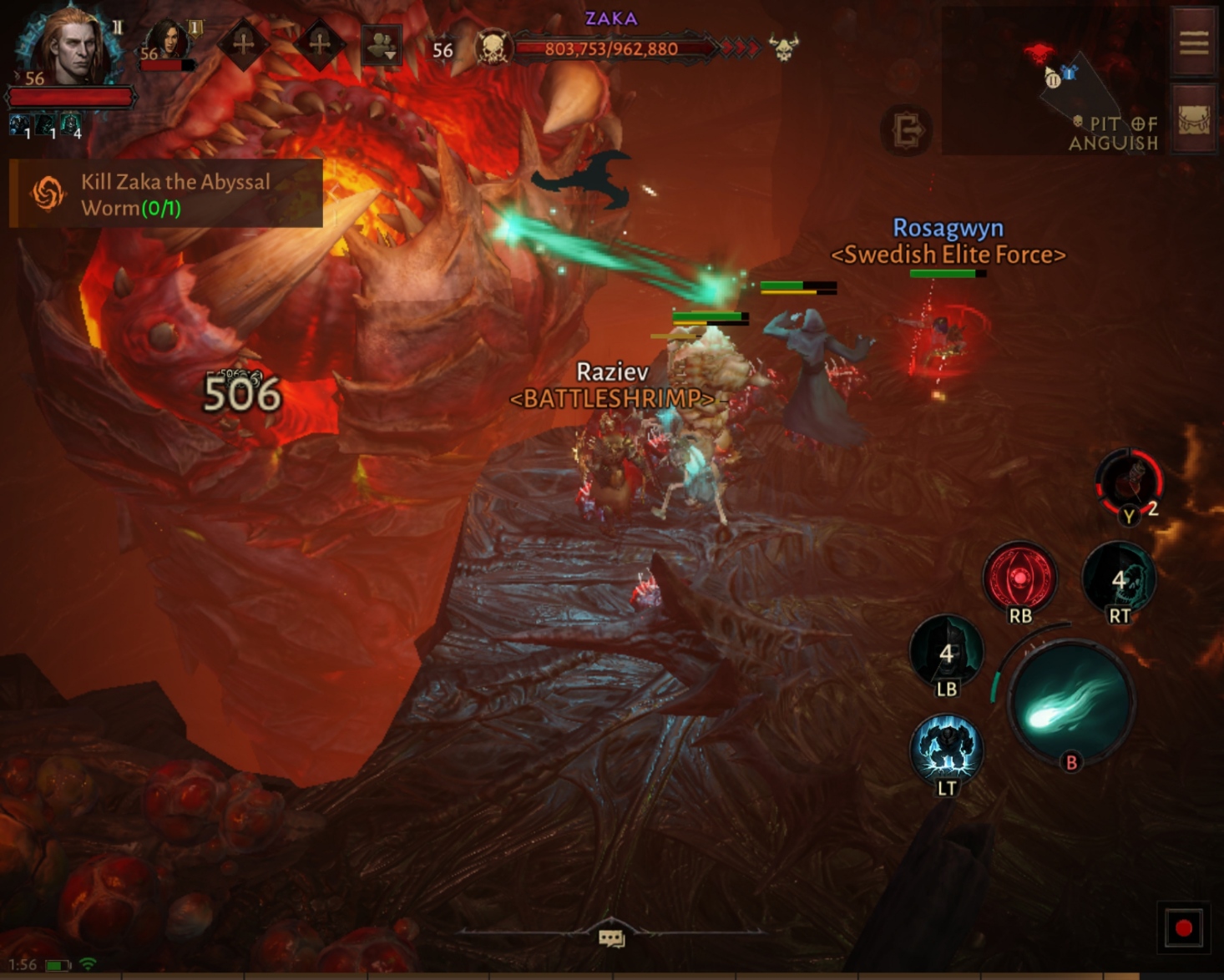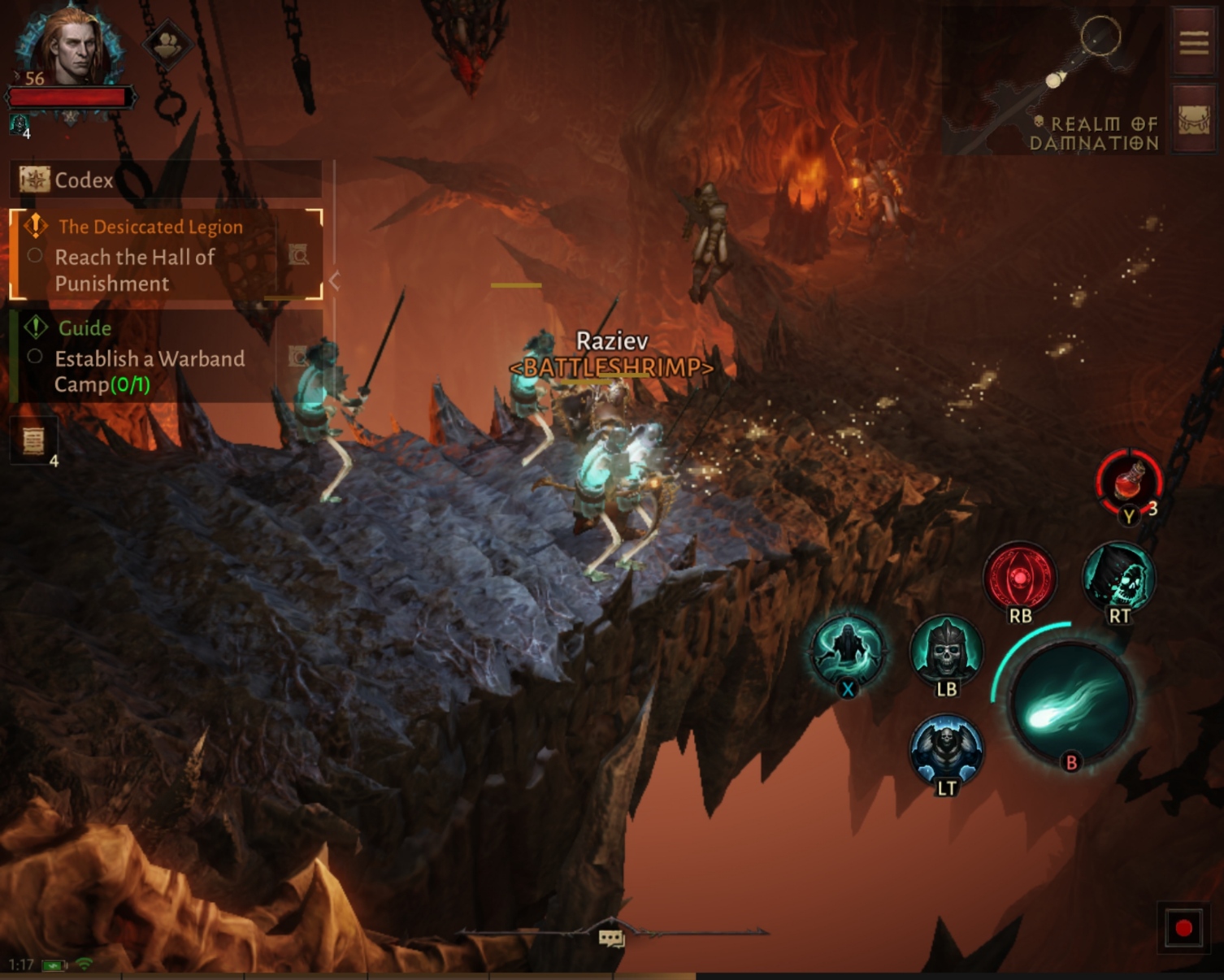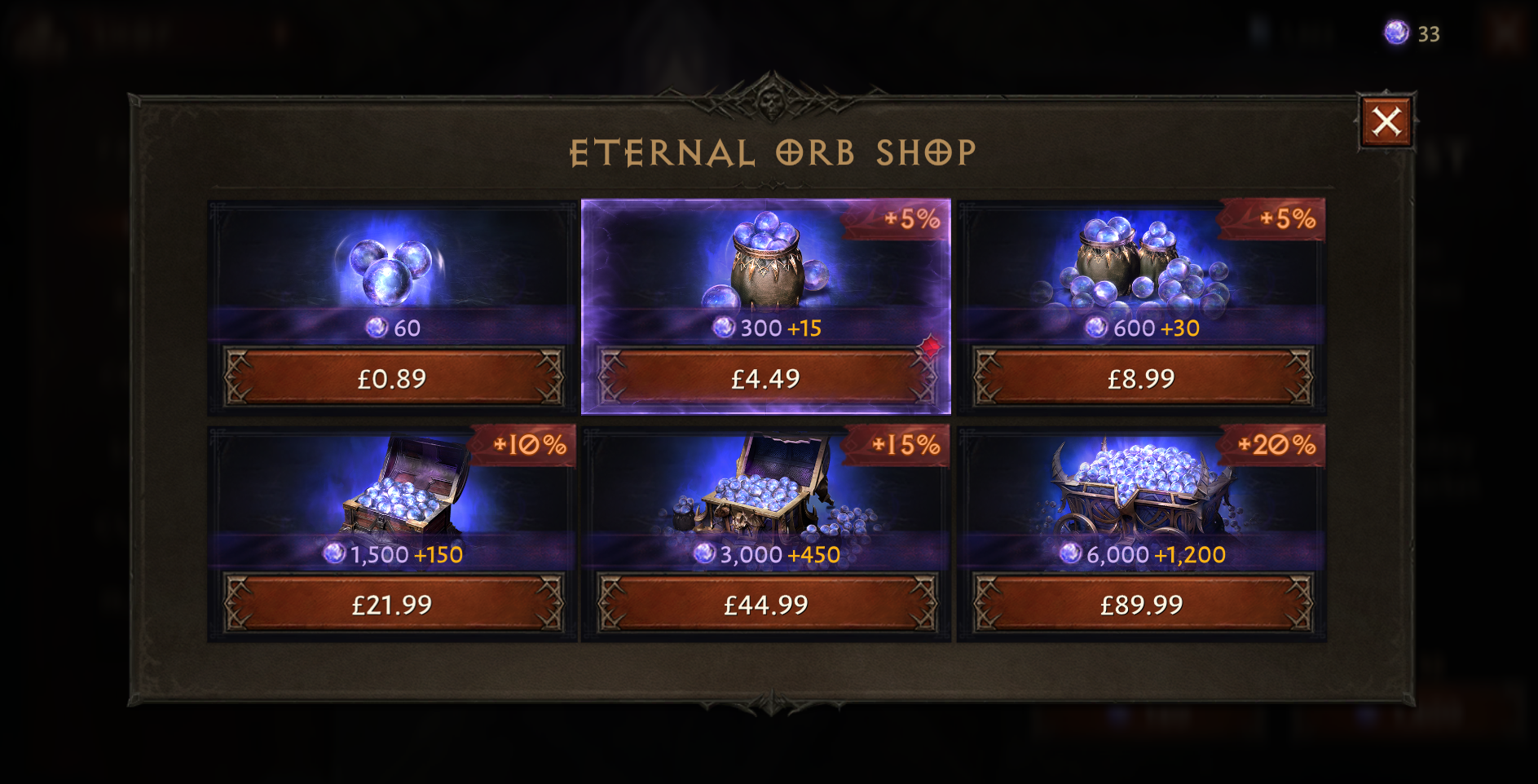As someone with past addiction issues, Diablo Immortal conjures sick feelings
And that's the point.

All the latest news, reviews, and guides for Windows and Xbox diehards.
You are now subscribed
Your newsletter sign-up was successful
Diablo Immortal has been a gaming community punching bag for years, but I would argue that the reality of the game is more frustrating than anyone cared to imagine back during its disastrous reveal.
For those who don't know, Diablo Immortal is a mobile action RPG from Blizzard Entertainment, known for games like Warcraft and Overwatch. Diablo is a flagship IP for the Blizzard brand, and given how amazing Diablo IV looks, I highly expect Diablo will supersede all other Blizzard franchises to become their top property in the coming year. Of course, the lion's share of that accolade will probably go towards Diablo Immortal, owing to its aggressive and shameless pay-to-win gambling microtransaction (MTX) systems.
I ignored these sorts of games up until now. Sure, pay-to-win mobile games are nothing new, and typically I ignore the latest trending mobile game, because I know to expect a casino masquerading as a game. But the Diablo and Blizzard fan in me couldn't ignore this one, and in my ignorance, discovered a truly horrific vision of what the future of gaming might look like if Activision Blizzard execs had their way.
In my naivete, I told myself that perhaps everyone was being extra, and that the MTX couldn't be that bad — surely Blizzard wouldn't stoop as low as everyone is claiming. I had to see for myself, and it turned out to be even worse than I'd have ever imagined.
What makes it worse still is that behind the greed that spawned this game, there is a truly incredible array of art, writing, gameplay, and story delivery that almost comes across like an apology for the soulless business model that festers at its core.
Diablo Immortal and games like it are nothing short of a blight on the industry, and should probably come with a warning label.
The campaign over-delivers in a way that almost feels apologetic
I quite honestly want to preface this with what I love about Diablo Immortal, because I know that the dozens of artists, writers, and developers who work on this game didn't wake up one day and think, "How can we make the most messed-up game in existence?"
All the latest news, reviews, and guides for Windows and Xbox diehards.
It's true that I have never quite loved and hated a game simultaneously so passionately as Diablo Immortal — because it's blatantly obvious this could have been a celebrated game, that defied the creeping rot of pay-to-win and progression-anchored gambling mechanics. Alas, what we have here is simply a lie.
Set in the gothic world of Sanctuary, you play as one of several magical adventurers who don enchanted equipment and ultimately set out to defend the world against evil. Sanctuary is a nestled oasis of comparative calm in a cosmos beset by war between heaven and hell. Hulking demonic engines seek to devour and corrupt humanity, and ultimately overthrow the heavens and dominate in an unrelenting quest for power. It's inside this tried-and-tested narrative that the Diablo universe takes place, and few franchises do it so compellingly.
Every aspect of Diablo Immortal's visual and mechanical style is a work of art. This has some of the best and most responsive touch controls I've experienced in a mobile game. The artwork and design are absolutely stunning, with a high-quality character creator system, with a huge diversity of biomes and locations. It has a vast menagerie of twisted beasts and monsters to slay, epic dungeon encounters with some truly jaw-dropping boss battles, and even a memorable story, with an unnerving demonic creature named Skarn serving as the central antagonist.
I have never quite loved and hated a game simultaneously so passionately as Diablo Immortal.
Throughout my time with Diablo Immortal, I was truly ensorcelled with what deceptively felt like a true Diablo experience. Blasting away swarms of monsters with my army of skeletons and undead necromantic beasts feels as good as it does in Diablo 3, regardless of what platform you choose to play on. I played about half of the campaign on PC, and half of it on my mobile phone. Some with touch, some with controller, and some with mouse and keyboard. It's truly a remarkable and seamless experience that is as impressive as Minecraft itself for platform agnosticism, with your progress following you no matter where you want to play.
The problem with that is, this writhing sense of foreboding also followed me, wherever I wanted to play. There was something about Diablo Immortal that felt all too familiar — a sick feeling, that I realize now is baked into the game by design.
Diablo's demonic themes are a convenient metaphor
Gene Park of the Washington Post recently wrote, "Diablo is about how anything is corruptible," in reference to the delivery of Diablo Immortal. There's frankly no better metaphor for what the game is, nor Blizzard's free-fall from grace as one of the industry's most celebrated publishers, to borderline pariah status.
Long-suffering Blizzard fans have watched the company hollow out World of Warcraft, ship one of the worst "remakes" in history in the form of Warcraft 3: Reforged, essentially kill the StarCraft franchise, and leave Heroes of the Storm in perpetual limbo. When Blizzard revealed Diablo Immortal, the response was outrage — because Diablo fans instinctively knew what mobile ultimately meant. It wasn't long after Blizzard confirmed a "true" sequel to Diablo III. Diablo IV looks incredible on paper, but you only need to look at the comments of any social media post referencing it to see a deluge of questions about pay to win and microtransactions.
I had to see for myself whether Diablo Immortal was really as bad as everybody was saying. I read the headlines about Twitch streamers plowing thousands of dollars into the game's microtransactional systems, only to receive none of the max-level loot the game's slot-machine gambling systems tease you with. The dirge of hyperbole and exaggeration that exists online is enough to push anyone to general skepticism, and hey, for a while I was having a blast with Diablo Immortal.
I was having so much fun with the game, I actually felt compelled to show some support by buying the Battle Pass, which for £16.99 gave me a steady stream of consumables, with the promise of a cool-looking cosmetic outfit at the end. I picked it up, and it wasn't long after that the game introduced me to one of its paid gambling systems, known as an Elder Rift.
Rifts were in Diablo III too, and feature procedurally populated dungeons with scaling difficulty, that comes with rewards at the very end. In Diablo III, they are, of course, free with the game. You can access them for free in Diablo Immortal as well, albeit with a nasty catch. To have even the vaguest chance of getting an item at the end of the run, you need to use a Crest, which, you guessed it, costs money. You can obtain a trickle of weaker Crests without paying, but Blizzard knows full well that this won't be viable for anyone who wants to keep up with the gear curve.
Blizzard has baked gambling into their games before, in the form of loot boxes. But these have been tied to cosmetic items that don't expire and don't give any competitive benefits to the player. Diablo Immortal is quite truly a different beast, with layers of transitory power progression rewards and added social pressure from its MMO formula. Indeed, higher-level players are forced to play in groups, which simply adds to the pressure cooker by design.
By picking up the Battle Pass I was unwittingly throwing myself into a Kafkaesque purgatory of in-game currencies and gambling systems, that aggressively reward those who pay up, and punish those who don't. The game actively tries to deceive the player, hoping to entrap you in a psychological vice that revolves around exploiting those with addictive tendencies, layered with limitless sunk cost fallacy.
I know this because I have struggled with addiction in my life. I don't like to talk about my personal struggles when producing content, but it's rare a game made me so viscerally disgusted — and it's sadly a disgust I know all too well.
I am someone who has been over 420 pounds at 5'8" in the past. I lost 200 pounds in my mid-20s, I gained a bunch back during the pandemic, but last year, once again, lost 100 pounds (using Microsoft Excel, no less). I'm also someone who just generally has an addictive personality, whether it's food, alcohol, or in the past, painkillers — it's something I've been trying to untangle about myself for two decades.
I sorely hope that I won't end up over 420 pounds again in the future, and have generally kept a lid on binge-eating and alcohol abuse. Yet, I felt myself deploying familiar mental gymnastics I used to use to justify buying up Crests in Diablo Immortal.
Diablo Immortal is specifically, and aggressively, designed with the intent to amplify and curate those very same addictive tendencies I try to bury. The game on-ramps you shamelessly with scaling rewards that are cheap to start with, but gradually increase in price, emblazoned with arbitrary "400% added value!" to trick you into thinking you're getting a deal. The game's Crests modify Elder Rifts to increase the chance of loot and gems dropping, which spew out of the chest in a familiarly satisfying fashion to Diablo III, poking at reward triggers that Diablo III players have already learned to enjoy.
The Crests essentially function in the same way as the draw of a slot machine. The Rifts themselves take no skill to complete and only last for about 2 minutes of gameplay. There's essentially no point to them besides finding out whether the money you spent translates into a reward at the end, and they almost always will — however, it more likely than not won't be a reward you actually need. Convincing you to, once again, feed it more dollars.

The strategies the addictive part of my brain would use to circumvent the rational part started coming into play. It's only through training myself to get control over my thoughts that I heard myself trying to conjure up familiar justifications to buy more Crests. It simply makes no rational sense in a game that will always reward the player who spent more.
Even if you get a ton of loot from one round of premium Crests, because of the way the game works, you'll only need more and more Crests in perpetuity. It's the same cycle as bingeing on anything in this way — chasing an end goal that ultimately never comes.
I got to Paragon level 15, trying to find a way to make Diablo Immortal's endgame fun without contributing to the casino. Unfortunately, the only fun Blizzard put into Diablo Immortal — the loot — is hidden behind layers of micropayments and gambling. It betrays the quality of the game and the developers who worked on it. It betrays gaming as a whole because it's another brick chipped out of the shrinking wall that stands against pay-to-win in AAA games.
Through Diablo Immortal, today's Blizzard is ultimately admitting that it doesn't care about the well-being of its audience.
If Diablo Immortal becomes the standard, AAA games will end up as playgrounds for the rich, where free-to-play players are simply there for richer players' amusement. And worse, for those who can't resist, they will be designed to exploit those with atypical neurology, or even trauma, which encourages addictive and potentially self-destructive behavior.
You may feel completely unaffected by Blizzard's dark patterns, and perhaps you're even someone who even enjoys spending your money that way and can afford to do so. I'm not trying to absolve myself of personal responsibility for my habits, nor am I suggesting that Diablo Immortal or video games are comparable to the destructive force of full-blown chemical dependency. It's simply that no video game has ever sparked memories of those sorts of chemical dependencies in my own life.
Ultimately, I'm disturbed at how the game made me feel, in various ways. Even if those feelings were in passing, video games are supposed to be fun — they're not supposed to twist and mold your psyche like this. Every system in Diablo Immortal is designed to prey upon its players, and the Diablo fanbase at large, wholly with intent. For me, this is Blizzard admitting that it doesn't care about the well-being of its audience.
The Microsoft acquisition can't come fast enough

Activision-Blizzard led by CEO Bobby Kotick has lurched from scandal to scandal, while losing tens of millions of its monthly active users through cut corners and short-sighted strategizing from Activision's executive layer. The decisions and actions of a small part of Activision Blizzard's management layer continue to blight the company's image, presiding over an exodus of top talent.
Then comes Microsoft, which seeks to purchase the company over the next year. I've written before about how I'm excited for the future of Blizzard under Microsoft, which as a fan, I hope only leads to a better quality of life for the company's developers and staff. Microsoft is one of the few big gaming companies that experimented with but ultimately pulled back on progressive gambling mechanics in its games. With Microsoft's renewed focus on mobile gaming via Xbox Game Pass, I can only hope they'll cast similar judgment over Diablo Immortal's business model once the acquisition closes. But again, perhaps that's naive of me.
At least actual casinos don't try to hide the fact that they're a casino.
It's painful seeing Diablo Immortal's art and design get overlooked amidst all this controversy, but I can only imagine how painful it is for someone who worked on the game and had no part in these "business" decisions. I'm sure Activision Blizzard execs tell themselves that they're the good guys for offering what amounts to a sizeable co-op ARPG for "free," but like the game itself, it's ultimately a lie to bury the sleazy casino hidden underneath. At least actual casinos don't try to hide the fact that they're a casino. Diablo Immortal beats you into a false sense of security before turning on the neon lights.
I have quit games because I was bored, I have quit games because I had completed them — but Diablo Immortal is the first time I've quit a game because I felt layers of disturbing psychological pressure. For me, it's a bit of a dark day.

Jez Corden is the Executive Editor at Windows Central, focusing primarily on all things Xbox and gaming. Jez is known for breaking exclusive news and analysis as relates to the Microsoft ecosystem — while being powered by tea. Follow on X.com/JezCorden and tune in to the XB2 Podcast, all about, you guessed it, Xbox!





